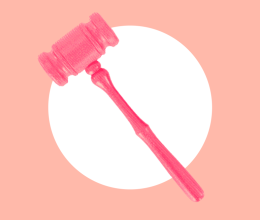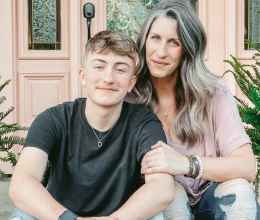
In a year that has seen many horrific attacks on transgender people, among the cruelest and most dangerous is Arkansas’ new law that bans gender-affirming care for trans youth. If it goes into effect in July, this law will cause catastrophic harms to transgender youth.
To prevent any further harms, four families with transgender children, along with two doctors who provide this care, filed suit today challenging the constitutionality of this new Arkansas law. The ACLU is proud to represent them. Because of the shocking nature of the harms this law would impose, this is the first lawsuit we are filing against any of the anti-trans laws that state legislatures passed this year — and more will be coming soon.
Brooke Dennis is 9 years old and is finishing up the third grade. She loves to read and write and wants to be a gymnast when she grows up. She’s also transgender, which means she was assigned \ male at birth but is a girl. As her mom put it, “Brooke has known exactly who she is since she was two years old.” Brooke has the support of her parents and the family has consulted with doctors who can provide gender-affirming care when puberty begins.
But Arkansas’ first-in-the-nation ban on gender-affirming health care for minors means that Brooke won’t be able to get puberty-delaying treatment, which is care she will soon need. If the law is not blocked, Brooke faces the prospect of going through a typical male puberty — growing facial hair, developing an Adam’s apple, seeing her body take on the fat and muscle distribution typical of boys, and hearing her voice deepen — all of which will cause her extreme distress.
Puberty delaying treatment, which pauses puberty so that young people can have time and space to confirm who they are without the permanent physical changes of puberty, is part of the well-established standards of care for treating many transgender youth. Puberty-delaying treatments have been used for decades to treat cisgender children experiencing precocious puberty, and are completely safe and totally reversible.
Brooke could start puberty at any time, and her parents plan to begin puberty-delaying treatment as soon as her puberty starts. Brooke is already anxious about puberty and recently told her mom, through tears, that she didn’t want to get an Adam’s apple. She has previously faced the anxiety, fear, and depression of not being seen and understood as who she is and fears going back.
While Arkansas’ new law prohibits the time-sensitive medical care that Brooke needs, the law allows cisgender youth to receive the same gender-affirming care, including both puberty blockers and hormone therapy, to help align their bodies with their gender, such as to address breast development in boys or facial hair in girls. The law bans the care only when provided to affirm the gender of transgender youth. Such brazen discrimination cannot be reconciled with the Constitution.
Every mainstream medical association — from the American Medical Association to the American Academy of Pediatrics — agrees that gender-affirming care is medically necessary and appropriate care for the transgender youth who need it. And the effects of withholding this care from transgender youth are chilling — self-harm and suicidal ideation are many times more common among transgender youth than among cisgender youth, especially when they cannot get the care and support that they need. Indeed, in just the week after the Arkansas House of Representatives passed this bill, Arkansas Children’s Hospital reported multiple suicide attempts by transgender youth distraught at what the new statute would mean for their future.
Arkansas’s Republican governor, Asa Hutchinson, vetoed this bill because he saw it as inappropriately overriding “parents, patients, and health care experts,” who are the ones who should determine the appropriate care for children. The state legislature overrode that veto, disregarding the consensus among the medical community and the harm to children like Brooke.
Transgender children in crisis shouldn’t have to turn to the courts to ensure that they can get the health care that their doctors and parents agree they need. But that’s the reality that anti-LGBTQ forces have created as part of their campaign of attacks on transgender youth.
Transgender youth and advocates fought against the over 75 anti-trans bills introduced in state legislatures this year. Whenever a bill was defeated, the voices of trans youth were instrumental in the victory. Tens of thousands of ACLU supporters acted by showing up at protests, sending emails to elected officials, and filling up governors’ inboxes urging vetoes on these discriminatory and harmful bills. We made a promise to take states that passed many of these bills to court, and today we are following through on that promise.
Brooke’s parents are anxious about what they will do if the law takes effect. They could travel out of state to get Brooke the care she needs, but that’s expensive and they don’t think it will be sustainable for long. The only other option is to move the family out of state, but Brooke’s grandparents live in Arkansas and need a lot of support, and Brooke’s parents help take care of them. If this law goes into effect, the Dennises will be forced to leave their aging parents behind to get their daughter the medical care she will need.
To keep their family together during Brooke’s medical care, Brooke and her parents, along with three other Arkansas families and two doctors, are taking this fight to court. The ACLU is proud to fight alongside transgender young people like Brooke, who are looking to protect not only themselves, but all youth who need this care.





